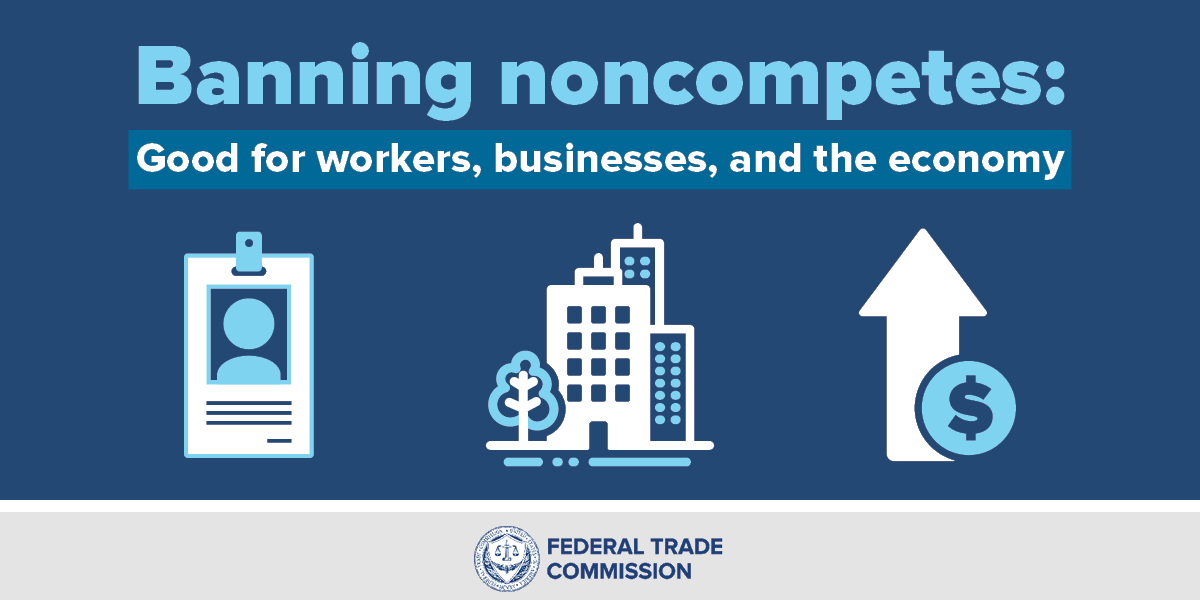At this time, the Federal Commerce Fee issued a last rule to advertise competitors by banning noncompetes nationwide, defending the basic freedom of staff to alter jobs, growing innovation, and fostering new enterprise formation.
“Noncompete clauses maintain wages low, suppress new concepts, and rob the American economic system of dynamism, together with from the greater than 8,500 new startups that might be created a yr as soon as noncompetes are banned,” stated FTC Chair Lina M. Khan. “The FTC’s last rule to ban noncompetes will guarantee Individuals have the liberty to pursue a brand new job, begin a brand new enterprise, or carry a brand new concept to market.”
The FTC estimates that the ultimate rule banning noncompetes will result in new enterprise formation rising by 2.7% per yr, leading to greater than 8,500 extra new companies created every year. The ultimate rule is predicted to lead to larger earnings for staff, with estimated earnings growing for the common employee by a further $524 per yr, and it’s anticipated to decrease well being care prices by as much as $194 billion over the following decade. As well as, the ultimate rule is predicted to assist drive innovation, resulting in an estimated common enhance of 17,000 to 29,000 extra patents every year for the following 10 years below the ultimate rule.
Noncompetes are a widespread and sometimes exploitative observe imposing contractual situations that stop staff from taking a brand new job or beginning a brand new enterprise. Noncompetes typically drive staff to both keep in a job they wish to depart or bear different vital harms and prices, reminiscent of being pressured to modify to a lower-paying subject, being pressured to relocate, being pressured to depart the workforce altogether, or being pressured to defend in opposition to costly litigation. An estimated 30 million staff—almost one in 5 Individuals—are topic to a noncompete.
Underneath the FTC’s new rule, present noncompetes for the overwhelming majority of staff will not be enforceable after the rule’s efficient date. Current noncompetes for senior executives – who characterize lower than 0.75% of staff – can stay in drive below the FTC’s last rule, however employers are banned from getting into into or trying to implement any new noncompetes, even when they contain senior executives. Employers will likely be required to supply discover to staff apart from senior executives who’re certain by an present noncompete that they won’t be imposing any noncompetes in opposition to them.
In January 2023, the FTC issued a proposed rule which was topic to a 90-day public remark interval. The FTC obtained greater than 26,000 feedback on the proposed rule, with over 25,000 feedback in assist of the FTC’s proposed ban on noncompetes. The feedback knowledgeable the FTC’s last rulemaking course of, with the FTC fastidiously reviewing every remark and making adjustments to the proposed rule in response to the general public’s suggestions.
Within the last rule, the Fee has decided that it’s an unfair methodology of competitors, and due to this fact a violation of Part 5 of the FTC Act, for employers to enter into noncompetes with staff and to implement sure noncompetes.
The Fee discovered that noncompetes are inclined to negatively have an effect on aggressive situations in labor markets by inhibiting environment friendly matching between staff and employers. The Fee additionally discovered that noncompetes are inclined to negatively have an effect on aggressive situations in product and repair markets, inhibiting new enterprise formation and innovation. There may be additionally proof that noncompetes result in elevated market focus and better costs for customers.
Alternate options to Noncompetes
The Fee discovered that employers have a number of options to noncompetes that also allow corporations to guard their investments with out having to implement a noncompete.
Commerce secret legal guidelines and non-disclosure agreements (NDAs) each present employers with well-established means to guard proprietary and different delicate info. Researchers estimate that over 95% of staff with a noncompete have already got an NDA.
The Fee additionally finds that as a substitute of utilizing noncompetes to lock in staff, employers that want to retain staff can compete on the deserves for the employee’s labor providers by enhancing wages and dealing situations.
Modifications from the NPRM
Underneath the ultimate rule, present noncompetes for senior executives can stay in drive. Employers, nonetheless, are prohibited from getting into into or imposing new noncompetes with senior executives. The ultimate rule defines senior executives as staff incomes greater than $151,164 yearly and who’re in policy-making positions.
Moreover, the Fee has eradicated a provision within the proposed rule that might have required employers to legally modify present noncompetes by formally rescinding them. That change will assist to streamline compliance.
As an alternative, below the ultimate rule, employers will merely have to supply discover to staff certain to an present noncompete that the noncompete settlement won’t be enforced in opposition to them sooner or later. To help employers’ compliance with this requirement, the Fee has included mannequin language within the last rule that employers can use to speak to staff.
The Fee vote to approve the issuance of the ultimate rule was 3-2 with Commissioners Melissa Holyoak and Andrew N. Ferguson voting no. Commissioners Rebecca Kelly Slaughter, Alvaro Bedoya, Melissa Holyoak and Andrew N. Ferguson every issued separate statements. Chair Lina M. Khan will challenge a separate assertion.
The last rule will develop into efficient 120 days after publication within the Federal Register.
As soon as the rule is efficient, market contributors can report details about a suspected violation of the rule to the Bureau of Competitors by emailing noncompete@ftc.gov.
